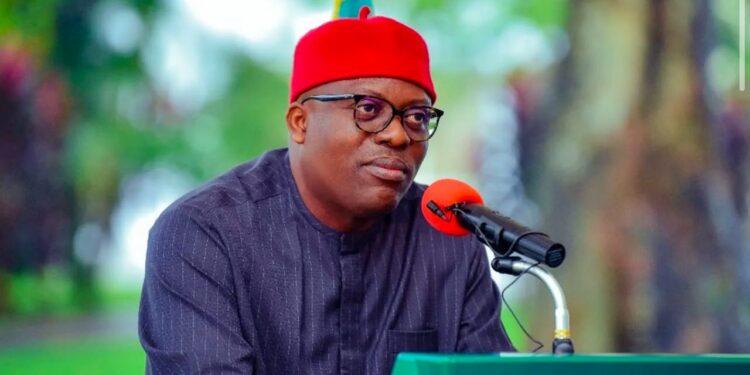By Emameh Gabriel
Politics in Rivers State has never been for the faint hearted, but what Governor Sim Fubara just pulled would make even the most seasoned political hustler raised an eyebrow. One minute he was the PDP’s poster boy, bravely standing up to federal might and his estranged godfather, Nyesom Wike. The next, he is doing a full somersault back into Wike’s arms, leaving his fellow PDP governors stranded in court like abandoned passengers at a Lagos bus park.
It all started with so much promise. Fresh off Wike’s endorsement, but in less than five months in office, Fubara had begun stretching his gubernatorial muscles, making moves that suggested he might actually be his own man. He tweaked Wike’s carefully assembled cabinet, gave side eye to the political structures that birthed him, and for a glorious moment, looked like he might pull off the unthinkable, calling the shots in Rivers State without Wike’s script. The PDP governors and self-serving Niger Delta leaders, ever eager for any chance to stick it to the ruling party, rallied behind him like backup dancers at a political concert.
Rivers State had transformed into a pressure cooker of political tensions, with the mercury of discontent rising to dangerous levels. The air in Port Harcourt grew thick with anticipation as rival factions circled each other like caged lions, their political claws unsheathed and ready to strike. What began as subtle power plays behind closed doors had erupted into full-blown street theater, complete with protests that turned highways into battlegrounds and legislative quarters into wrestling rings. The state’s political thermometer wasn’t just rising, it was threatening to shatter the glass, as ordinary citizens watched helplessly while their governor and godfather engaged in a high stakes game that threatened to plunge the entire state into chaos. Every new day brought fresh rumours of impending doom, would the Assembly be stormed again? Would more commissioners resign? Would federal might come crashing down? The tension became so palpable that you could practically taste it in the pepper soup at roadside bukkas, where anxious residents debated the latest developments between nervous sips of palm wine.
Then the roof caved in.
The Supreme Court’s ruling that there was effectively “no government” in Rivers State hit like a poorly timed punchline. Fubara’s authority evaporated overnight, and left him looking less like a governor and more like a man who had just realised he would been sitting in the wrong office for months. Meanwhile, the PDP governors were already mid stride in their legal challenge, briefcases in hand, ready to fight for democracy.
Faced with alarming intelligence reports warning of imminent breakdown of law and order, President Tinubu was forced to take decisive action to prevent Rivers State, and by extension, the entire Niger Delta region from descending into anarchy. Security briefings painted a grim picture: the state assembly, firmly under Wike’s influence, was preparing to trigger a constitutional crisis through impeachment proceedings, while underground forces were reportedly mobilising for possible violent confrontations. The political temperature had reached such dangerous levels that the very foundations of governance were crumbling, with state institutions becoming mere pawns in a high-stakes power struggle.
In a move aimed at preventing the volatile situation from exploding into full-blown regional instability, the President invoked constitutional provisions to suspend the warring factions – Governor Fubara, his deputy, and the factionalised state assembly – while declaring a state of emergency. This extraordinary measure came after behind-the-scenes attempts at reconciliation had failed spectacularly, leaving the federal government with no choice but to intervene before Rivers State became another tale of political brinksmanship gone wrong. The decision, while controversial, revealed the sobering reality that the political gladiators in Port Harcourt had become so consumed by their power tussle that they were willing to risk setting the entire region ablaze to settle scores.
Few months after his suspension, Fubara, who had been playing the defiant hero, has suddenly switched scripts. Instead of resisting, he thanked Tinubu. Thanked him! It was like a bank robber hugging the police for arresting him because, hey, at least he wouldn’t have to run anymore.
Governor Fubara stands politically battered and emotionally drained, his initial bravado is now replaced by the sober realisation that this is a fight he simply cannot win. The writing has been on the wall for weeks – watching fellow PDP governors either flounder in their attempts to revive the struggling party or quietly defect to Tinubu’s camp, the same administration that suspended his own government. The political calculus has become painfully clear to him, he needs to a survival instinct first.
With his political capital dwindling and his support base eroding, Fubara declared on Thursday, May 29, to his bewildered supporters that for the sake of peace and development in Rivers State, he was prepared to swallow his pride and go cap in hand to his estranged political godfather, Wike – the very architect of his current predicament. Fubara is exhausted by the battle and missing the sweet nectar of actual power (not to mention the perks), he has had enough.
Meanwhile, the PDP governors are still in court, still waving their legal papers like confused wizards, watched in horror as their champion pulled a U-turn smoother than a danfo driver escaping LASTMA. The PDP governors are left holding the bag, their court papers suddenly feeling heavier than a sack of unfulfilled promises. They came to fight for Fubara, but Fubara, it seems, was only ever fighting for Fubara. The man who was supposed to be their standard-bearer against federal overreach is now back to making peace with the same forces they are suing, leaving them looking less like defenders of democracy and more like the last people at a party nobody told was over.
Somewhere in Abuja, Wike must be smiling into his glass of wine. In Port Harcourt, Fubara is probably just relieved the heat is off. And in court, the PDP governors are learning the oldest lesson in Nigerian politics the hard way: in this game, there are no permanent allies, only permanent interests. And right now, Fubara’s clearest interest appears to be surviving to fight another day, even if it means leaving his cheerleaders out in the cold.












































Discussion about this post